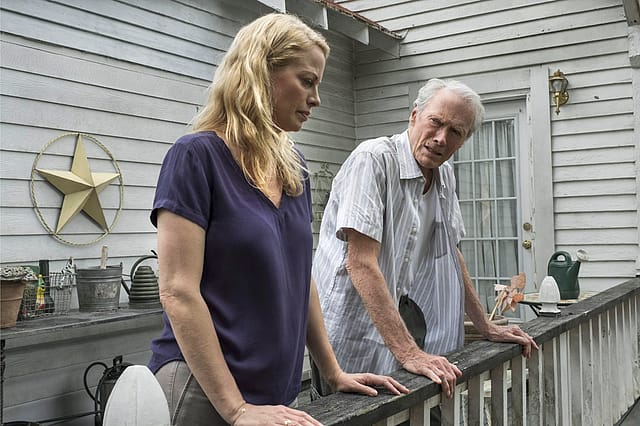The Mule Movie Review

Earl Stone, the 90 year old protagonist of this movie, does not like the internet and hates cell phones. He blames the convenience of electronic connectivity for eating into his horticulture business, and says phones addle the mind. People call him 'pops' and 'grandpa', and he hits back with snarky comments about their addiction to the instrument, and their inability to let go and enjoy life.
Based on a newspaper story about a 90 year old 'mule', a transporter for the drug cartel, who was finally arrested after hundreds of trips across the continental USA, Earl seems to get happier as he grows old. It is, of course, much easier for an ageing white male to be on the highway than it is for people who look latino or black. Driving across from the Southern States to the Northern is great fun for Earl (Clint Eastwood) as he is treated generously by a wide spectrum of society. He knows where to get the best sandwiches, talk kindly and convincingly to intrusive cops, flatter older women, persuade young ladies to bestow their favours to him – all natural privileges of the ruling class.
It is a lovely and gentle film, easy on the eye and mind, and exceptionally beautiful with its wide angled panoramic shots of the American landscape, as it slowly changes during Earl's repeated drives. The film's comments on the process of ageing, and the dual perspective it triggers is perceptive. Younger people pay half a mind's attention to what Earl says, with the implied attitude that old people do not get it, and so it doesn't really matter what they think or what you say to them. While he, on the other hand, is as sharp as a tack, and observes everything, including a lot what the younger people have missed, what with their distractions on the phone and computer.
2026 New Year Issue
Essays by Shashi Tharoor, Sumana Roy, Ram Madhav, Swapan Dasgupta, Carlo Pizzati, Manjari Chaturvedi, TCA Raghavan, Vinita Dawra Nangia, Rami Niranjan Desai, Shylashri Shankar, Roderick Matthews, Suvir Saran
Director Eastwood's point in the film is that society's incomprehension, or disinterest, in older people is what the real life 'mule' exploited and got away with for so many years. But along with this insight, is also a singular distaste for getting into the nitty gritty of the immorality of the drug business. Earl takes the assignments to take care of his debts. But over the many trips he makes, his initial desperation turns into avariciousness and he starts wearing decorative gold chains on his arm. He has clearly bought into the notion that what he is doing is nothing but a lucrative business that he happened to stumble upon. His own good luck, as it were.
The film completely ignores the psychological process by which a Korean War veteran, who has served his nation, justifies what he routinely does, to himself. There are no shades of grey to the character of Earl Stone. But then, this is a characteristic of the Eastwood persona in general. He presents himself as a clear sighted man who does what he does because of the clarity of his vision as an inheritor of a great tradition, both in American society and in film, take it or leave it.
As a result the drug cartel, and Mexicans in general, are stereo-typed in 'The Mule'. This affects the realism of the film, especially when you see the traffickers being ridiculously indiscreet; pushing guns in faces, talking and behaving in foolish and threatening ways, and knocking each other out every now and then. By not bothering to sub-title the conversations in Spanish (at least in the Indian release), the attitude is a bit indifferent, as if to say, well, you know what these guys always talk about, so why bother.
But at the same time 'The Mule' is also a most enjoyable film, with gentle humour surrounding the charismatic 88 year old actor and director. The autumnal feel of the movie rides over some of the more obvious flaws in it.
